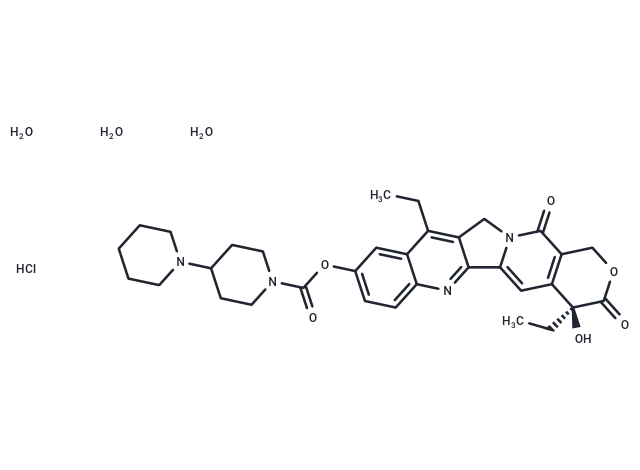Shopping Cart
- Remove All
 Your shopping cart is currently empty
Your shopping cart is currently empty

Irinotecan hydrochloride trihydrate (CPT-11 HCl Trihydrate) keeps DNA from unwinding by inhibiting topoisomerase 1.

| Pack Size | Price | Availability | Quantity |
|---|---|---|---|
| 25 mg | $36 | In Stock | |
| 50 mg | $52 | In Stock | |
| 100 mg | $72 | In Stock | |
| 200 mg | $96 | In Stock | |
| 500 mg | $162 | In Stock | |
| 1 mL x 10 mM (in DMSO) | $57 | In Stock |
| Description | Irinotecan hydrochloride trihydrate (CPT-11 HCl Trihydrate) keeps DNA from unwinding by inhibiting topoisomerase 1. |
| In vitro | In the liver, stomach, duodenum, and colon, a single dose of Irinotecan significantly increases the covalent binding of topoisomerase I to DNA. Compared to the control group, there is a marked increase in DNA strand breaks within the colonic mucosal cells in the Irinotecan-treated group. In COLO320 xenografts, Irinotecan induces a 92% maximum growth inhibition. |
| In vivo | In LoVo and HT-29 cell lines, Irinotecan induces a similar number of cleavable complexes at IC50 concentrations, with no significant difference observed between the two. The formation of cleavable complexes by SN-38 is concentration-dependent and consistent across both cell lines. Notably, intracellular accumulation of Irinotecan differs significantly, with consistently higher levels in HT-29 cells compared to LoVo cells. Carboxylesterase activation of Irinotecan to SN-38 (primarily in the liver) facilitates interaction with its target, topoisomerase I, in plasma, intestines, and tumor tissues. The hydrolysis of Irinotecan’s lactone E-ring and SN-38 is reversible in aqueous solution, with the interconversion of their carboxylate and lactone forms dependent on temperature and pH. For the same concentration of SN-38 glucuronide and Irinotecan in tumor and normal tissues, the yield of SN-38 via β-glucuronidase mediation exceeds that of SN-38 produced from Irinotecan. In SCLC cell lines, Irinotecan exhibits markedly greater activity than in NSCLC cell lines, while tissue histology does not reveal significant differences in SN-38 efficacy. |
| Cell Research | Exponentially growing cells (LoVo and HT-29 cells) are seeded in 20 cm2 Petri dishes with an optimal cell number for each cell line (2 × 104 for LoVo cells, 105 for HT-29 cells). They are treated 2 days later with increasing concentrations of Irinotecan or SN-38 for one cell doubling time (24 hours for LoVo cells, 40 hours for HT-29 cells). After washing with 0.15 M NaCl, the cells are further grown for two doubling times in normal medium, detached from the support with trypsin-EDTA and counted in a hemocytometer. The IC50 values are then estimated as the Irinotecan or SN-38 concentrations responsible for 50% growth inhibition as compared with cells incubated without Irinotecan or SN-38. (Only for Reference) |
| Alias | Irinotecan HCl Trihydrate, CPT-11 HCl Trihydrate |
| Molecular Weight | 677.18 |
| Formula | C33H45ClN4O9 |
| Cas No. | 136572-09-3 |
| Smiles | O.O.O.Cl.CCc1c2Cn3c(cc4c(COC(=O)[C@]4(O)CC)c3=O)-c2nc2ccc(OC(=O)N3CCC(CC3)N3CCCCC3)cc12 |
| Relative Density. | no data available |
| Storage | Powder: -20°C for 3 years | In solvent: -80°C for 1 year | Shipping with blue ice. | ||||||||||||||||||||||||||||||||||||||||
| Solubility Information | H2O: 1 mg/mL (1.48 mM), Sonication is recommended. Ethanol: 7 mg/mL (10.34 mM), Sonication is recommended. DMSO: 45 mg/mL (66.45 mM), Sonication is recommended. | ||||||||||||||||||||||||||||||||||||||||
Solution Preparation Table | |||||||||||||||||||||||||||||||||||||||||
H2O/Ethanol/DMSO
Ethanol/DMSO
DMSO
| |||||||||||||||||||||||||||||||||||||||||

Copyright © 2015-2025 TargetMol Chemicals Inc. All Rights Reserved.